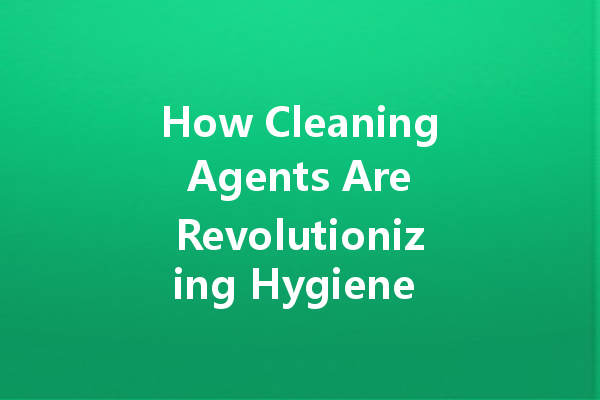Introduction
In today’s world, maintaining cleanliness and hygiene has never been more crucial. From household chores to industrial cleaning, the products we use play a significant role in ensuring environments are not just clean, but also safe. This article explores how cleaning agents are transforming hygiene standards, the innovations driving these changes, and what consumers should look for in these products.
The Importance of Hygiene Standards
In the wake of global health concerns, hygiene standards have taken center stage. Bacterial and viral infections can spread rapidly without proper cleaning, making it essential to use effective cleaning agents. Cleaning agents are not merely about appearance; they help eliminate harmful pathogens, contributing to better health and safety in homes, workplaces, and public spaces.
Innovations in Cleaning Agent Formulations
The Rise of Eco-Friendly Cleaning Agents
One of the most significant trends in the cleaning industry is the emergence of eco-friendly cleaning agents. These products are formulated with biodegradable ingredients that are safer for both the environment and users. Many manufacturers are now prioritizing sustainable practices by utilizing plant-based materials and reducing harmful chemicals. This shift helps address growing consumer concerns regarding environmental impacts and personal health.
Advanced Cleaning Technology
Innovative formulations have also introduced advanced cleaning technologies. For example, antibacterial agents and enzyme-based cleaners are designed to target specific types of dirt and germs more effectively. Enzymatic cleaners can break down organic matter, making them especially useful in kitchens and bathrooms. These advancements not only improve cleaning efficiency but also enhance overall hygiene.
Consumer Expectations and Safety Regulations
Understanding Labels and Ingredients
As consumers become more conscious of what they are putting in their homes, transparency in cleaning agents is vital. People often look for cleaning products that are labeled as non-toxic, hypoallergenic, or free from certain harmful ingredients. Regulations require manufacturers to disclose ingredients, enabling consumers to make informed choices that prioritize their health and safety.
Compliance with Regulations

Alongside consumer expectations, cleaning agents must comply with rigorous safety regulations. Organizations such as the Environmental Protection Agency (EPA) oversee the approval of cleaning products, ensuring they meet specific safety standards before reaching the market. This oversight helps maintain high hygiene standards across various environments, from residential to commercial.
The Role of Cleaning Agents in Specific Industries
Healthcare Settings
In healthcare environments, the role of cleaning agents is paramount. Disinfectants must be effective against a wide range of pathogens, including viruses and bacteria that can lead to serious health issues. Hospitals and clinics often employ more potent cleaning agents to ensure that surfaces are sanitized thoroughly, reducing transmission risks for patients and staff alike.
Food Industry
The food industry is another sector heavily reliant on cleaning agents. Hygiene standards in food preparation and service spaces are strict to prevent foodborne illnesses. Cleaning agents used in these environments are specifically formulated to be safe for food contact surfaces while effectively removing grease, dirt, and bacteria.
The Future of Cleaning Agents
Continued Innovation
The future looks promising for cleaning agents, with research and development ongoing to create even more effective and safe products. Innovations such as biodegradable formulations, smart cleaning technologies, and improved efficacy against renowned pathogens are expected to shape the industry.
Embracing Consumer Trends
As consumer trends shift toward environmentally friendly and health-conscious products, manufacturers are adapting their offerings. The demand for sustainable cleaning solutions is likely to drive further innovations in this field, with an increased focus on formulations that balance efficacy and environmental impact.
Conclusion
The significance of cleaning agents in maintaining high hygiene standards cannot be overstated. From eco-friendly formulations to advanced cleaning technologies and stringent regulations, the industry is evolving rapidly. Consumers now have a wide array of options, ensuring they can choose products that not only clean effectively but also support a healthier environment. As innovations continue, cleaning agents will play an even more critical role in safeguarding public health and revolutionizing hygiene standards for generations to come.
